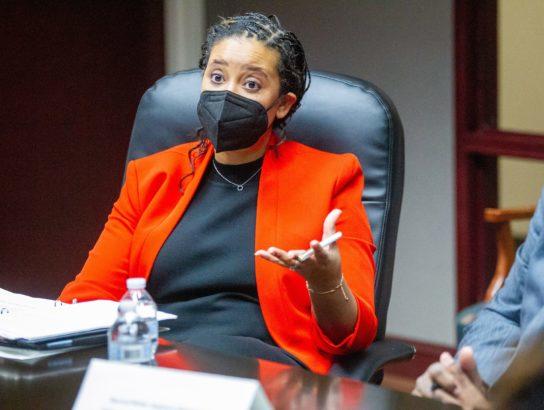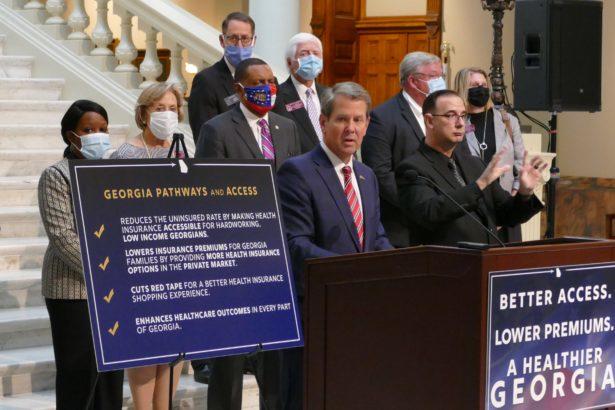
Section Branding
Header Content
Georgia health proposals hang in the balance as Biden official visits
Primary Content

A top federal official in charge of negotiating with Gov. Brian Kemp on Georgia’s high-stakes health care proposals visited Atlanta on Tuesday to talk about maternal health and other topics.
But Chiquita Brooks-LaSure, the Centers for Medicare and Medicaid Services administrator, had no answers for when any of the half-million adults uninsured under current Georgia Medicaid rules might have a pathway to coverage.
Kemp and Brooks-LaSure didn’t even meet. A Kemp spokeswoman said the governor’s office got no invitation for a meeting.
It’s been more than a year since the Trump administration stamped a last-minute approval on two of Kemp’s health care “waiver” plans as Donald Trump’s presidential term drew to a close. And it’s been several months since President Joe Biden’s administration raised concerns and paused the plans.
Meanwhile, half a million Georgians remain uninsured in the “coverage gap”: too poor for subsidized ACA exchange insurance under federal law, and ineligible for Medicaid under current Georgia rules.
Both sides say they’re still in talks.
“We’re having conversations with Georgia,” Brooks-LaSure said, when pressed on the waivers. A bill that Democrats support in Congress, the Build Back Better Act, as currently written would provide a work-around for the federal government to provide coverage in the health insurance exchange to all poor adults in the states that have not expanded Medicaid. That bill has not yet passed the Senate.
The latest version of the roughly $2 trillion social spending bill eliminated nearly $8 billion in “disproportionate share” hospital cuts to facilities in states that don’t expand Medicaid.
Hospital groups have lobbied hard to block those cuts, which would have affected only Georgia and 11 other states that have not expanded Medicaid under the Affordable Care Act..
A spokeswoman for Kemp, Katie Byrd, said “the discussions are continuing” with the administration on the Georgia waiver plans.
In Kemp’s waiver proposal for increasing Medicaid enrollment, an estimated 50,000 people would end up being covered. The Biden administration would prefer that Georgia expand Medicaid to all its poor adults.
Instead, Georgia proposes to expand Medicaid only to those who meet certain activity requirements, including working at a regular job, for 80 hours per month.
Kemp’s office estimated that more than 400,000 people would not meet the Medicaid requirements and would be left uninsured. Kemp and the Trump administration argued that the proposal would improve people’s lives by valuing work. The Biden administration argues that it adds unnecessary barriers to coverage.
“I think we’ve made very clear our concern, particularly during this COVID-19 pandemic, one that we haven’t seen in generations, how concerned we are around work requirements,” Brooks-LaSure said.
The Biden administration has not approved any of the state’s proposed work requirements.

In the other waiver proposal, for the Affordable Care Act’s marketplace exchange, Kemp would block Georgians’ access to shopping on the main federal website, healthcare.gov. That’s where the majority of the state’s more than 500,000 ACA policyholders currently buy their plans.
Instead, Georgia’s proposal would direct those consumers to deal with insurance companies directly or with private insurance agents to find plans. The waiver proposal would also make other changes.
The Biden administration is pushing back on that proposal, and has requested comments from the public in Georgia. People can submit them until Jan. 9.
Brooks-LaSure spent Tuesday morning with patients and health care providers concerned with maternal mortality and African American maternal health at the Center for Black Women’s Wellness in Atlanta. Georgia has one of the developed world’s worst rates of women dying for reasons related to pregnancy, and those rates are about three times higher for Black women.
CMS said Tuesday that it is encouraging hospitals to implement patient safety practices for managing obstetrical emergencies along with interventions to address other major contributors to maternal health disparities.
Maternal health “is a huge priority for the administration,’’ Brooks-LaSure told reporters Tuesday. “This is a crisis.”
CMS also intends to propose a “Birthing-Friendly” designation to drive improvements in perinatal health outcomes and maternal health equity.
This story comes to GPB through a reporting partnership with Georgia Health News.


